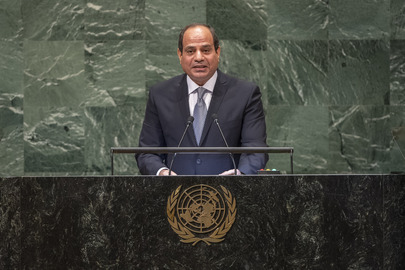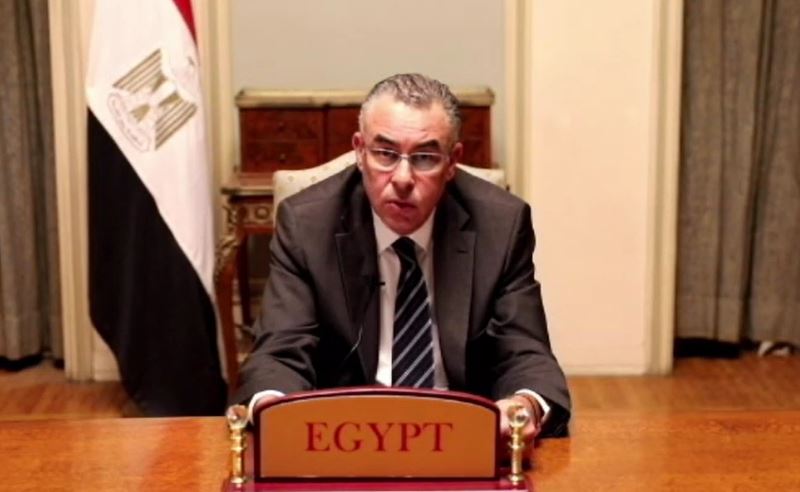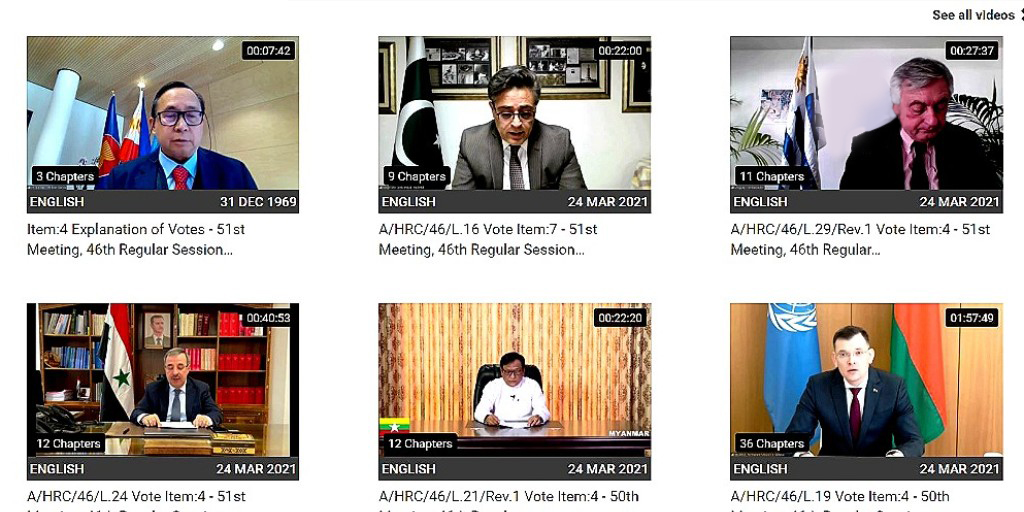The United Nations Human Rights Council has called out the Arab Republic of Egypt to end suppression of freedoms of expression and assembly. The council expressed “deep concern” for pervasive human rights violations committed with impunity by Egyptian authorities.
A joint statement was signed by 31 mostly Western nations, including the United States, which has observer status on the council. The U.S. recently rejoined the body after unceremoniously leaving during the administration of former President Donald Trump. No African or Middle East countries were on the list of signatories on the statement.
“We draw particular attention to restrictions on freedom of expression and the right to peaceful assembly, the constrained space for civil society and political opposition, and the application of terrorism legislation against peaceful critics,” said Finland Ambassador Kirsti Kauppi, who delivered the statement on behalf of the nations.
“We urge Egypt to guarantee space for civil society––including human rights defenders––to work without fear of intimidation, harassment, arrest, detention or any other form of reprisal,” said Amb. Kuappi.
The nations met during the 46th Regular Session of the United Nations Human Rights Council held Feb. 22-March 23 in Geneva, Switzerland. The conference was attended by foreign ministers, ambassadors, human rights experts, and organizations.
The issue of Egypt was raised March 12 in the council’s “General Debate on Human Rights Situations that Require the Council’s Attention” session. The North African country was one of several countries brought to task.
Egypt has been under fire for its prosecution of activists, journalists, and political opponents under the guise of counterterrorism measures and national security, which some critics say, are often used as false pretexts for arresting peaceful opponents and rights advocates.
The document, which is being lauded as a victory, called on Egypt to not impede rights groups, lift restrictions on media and digital freedom, end the practice of blocking the websites of independent media outlets, and to release all journalists arrested while practicing their profession.

Although rights organizations see the stance as a win, some observers question, whether international bodies will do anything behind the declaration.
The resolution to call Egypt out is good, however the question is, now what, asked Bill Fletcher Jr., former president of TransAfrica Forum and a senior scholar with the Institute for Policy Studies.
Mr. Fletcher told The Final Call, without a mechanism to enforce the demand, such UN resolutions are empty words. He used the example of other rights issues such as the Israeli/Palestinian conflict and the Morocco/Western Sahara question where resolutions were made, however a substantive means of execution was lacking.
“The problem is not new,” said Mr. Fletcher. “Unless there’s specific action that’s taken to introduce sanctions or some other penalty, what these resolutions end up being are the equivalent of an opinion piece,” he reasoned.
Mr. Fletcher said the resolution does add credence to Egyptian civil society organizations to continue protesting actions against rights abuses. “But it’s different than governmental bodies being obligated to do something,” he said. “It also means that we can pressure governmental bodies … but that’s the limit,” he added.

Many rights advocates applauded the joint statement as a positive signal from the council, which some criticized as being a past enabler of unaccountability for violations in Egypt. They complained that inaction by member states and Egypt’s partners on the Council has emboldened the Egyptian government “in its efforts to silence dissent and crush independent civil society.”
In early February over one hundred leading human rights organizations sent a collective letter to the Council pushing for Egypt to be addressed with a clear message at the 46th Regular Session.
The collective asked that a “monitoring and reporting mechanism” on the human rights situation in Egypt be established. They said, in Egypt the human rights struggle itself is at a “critical juncture.”
“For years civil society has warned that the Egyptian government is attempting to annihilate human rights organizations and eradicate the human rights movement in the country” the letter said.
Activists say the stand was long overdue and a step forward. “The March 12 declaration ends years of a lack of collective action at the UN Human Rights Council on Egypt, despite the sharply deteriorating human rights situation in the country,” said Bahey Hassan, director of the Cairo Institute for Human Rights Studies in a statement.

In August 2020, Mr. Hassan was sentenced to 15 years in prison in absentia by an Egyptian Terrorism Circuit Court for his advocacy work.
“Countries should continue to make it clear to the Egyptian government that it will no longer have a carte blanche to arbitrarily imprison, torture or violate the right to life or unlawfully kill people,” Mr. Hassan stated.
In response, the Egyptian Ministry of Foreign Affairs denounced the joint statement as “groundless discourse based on inaccurate information,” and lambasted member states for signing the document.
Egypt’s foreign minister, Sameh Shoukry retorted the statement was carelessly issued, absent of “facts and information being clarified” to the countries regarding the human rights situation in Egypt. He is calling for a thorough review of the omitted information, and for the 31 countries to stop making accusations and baseless claims. The foreign minister argued the issue of human rights involves a process of permanent development.
“No country has reached the point of perfection or can designate itself as an evaluator or judge in this regard,” said Mr. Shoukri.
In a rebuttal at the conference on March 15, Egyptian government spokesman Ahmed Jamal Bahaa El-Din characterized many of the signatories as hypocrites. “The council is being misused by countries that think they have the right to evaluate others while they cover-up their own violations,” said Mr. El-Din.
“Finland, Sweden, Denmark, Iceland and Norway are described as the most respectful of human rights, yet as soon as refugees arrived in these countries, they had their properties confiscated and were met with racist tweets against Africans and Muslims from their politicians,” he said.
“Even though slavery has been abolished, yet we discover it still has deep roots in communities in the U.S, UK Canada, Australia, and New Zealand, where non-White people are treated as second-class citizens,” he stated.
On Germany, Ireland, Austria, France, Belgium, and the Netherlands, they demand freedom of expression and peaceful demonstrations to others, but when protests occur in their countries, they are shut down by force and unjustified violence, Mr. El-Din said.
Observers also noted, the U.S. signature is a rare departure from past positions. As a decades long ally, particularly throughout the 29-year rule of former President Hosni Mubarak to the present, Egypt has been the largest recipient of U.S. foreign military assistance, second only to Israel. Egypt is allocated $1.3 billion annually in American aid, according to foreignAssistance.gov.
Historically U.S. administrations has winked its eye to Egyptian abuses, says observers. Former President Donald Trump once called current Egyptian Pres. Abdel Fattah el-Sisi, “my favorite dictator,” and remains questionable if U.S.-Egyptian relations have changed.
The U.S. signature comes less than 30 days after President Joe Biden approved a $197 million arms sale, containing 168 tactical missiles, to the Egyptian government.
For Kevin Whelan, Amnesty International UN representative in Geneva, the declaration sends a clear message that the world will no longer turn a blind eye to a relentless campaign to crush peaceful dissent. The Egyptian authorities must take “urgent action” to comply with their obligations under international law.
“Starting by releasing the thousands of men and women arbitrarily detained, protecting those in custody from torture … and ending the crackdown on peaceful activism,” said Mr. Whelan.













